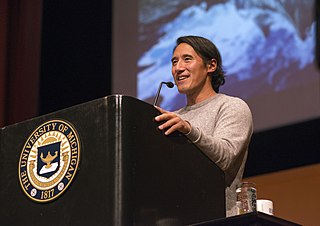A Quote by Friedrich Nietzsche
I climb upon the highest mountains, laughing at all tragedies - whether real or imaginary.
Related Quotes
The tops of mountains are among the unfinished parts of the globe, whither it is a slight insult to the gods to climb and pry intotheir secrets, and try their effect on our humanity. Only daring and insolent men, perchance, go there. Simple races, as savages, do not climb mountains,--their tops are sacred and mysterious tracts never visited by them. Pomola is always angry with those who climb the summit of Ktaadn.
Even the very youngest children already are perfectly able to discriminate between the imaginary and the real, whether in books or movies or in their own pretend play. Children with the most elaborate and beloved imaginary friends will gently remind overenthusiastic adults that these companions are, after all, just pretend.
One might think this means that imaginary numbers are just a mathematical game having nothing to do with the real world. From the viewpoint of positivist philosophy, however, one cannot determine what is real. All one can do is find which mathematical models describe the universe we live in. It turns out that a mathematical model involving imaginary time predicts not only effects we have already observed but also effects we have not been able to measure yet nevertheless believe in for other reasons. So what is real and what is imaginary? Is the distinction just in our minds?
The poet Marianne Moore famously wrote of 'real toads in imaginary gardens,' and the labyrinth offers us the possibility of being real creatures in symbolic space...In such spaces as the labyrinth we cross over [between real and imaginary spaces]; we are really travelling, even if the destination is only symbolic.









































